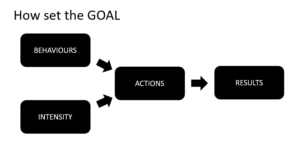“Any given day”, sales teams are struggling with unqualified leads, missed sales goals, and lost opportunities. Increasingly, company and sales leaders are turning to coaching as a solution.
What it’s commonly see are sales managers and leaders who:
- Don’t have time to coach
- Aren’t sure what sales coaches are supposed to do
- Don’t have access to the tools and resources that can help them get the most of coaching
- Don’t establish consistent rhythm of coaching conversations
- Can’t lead a great coaching conversation
The best sales coaches—the ones who get it right—play the following 5 specific roles in the sales coaching process.

5 Roles of High-Performing Sales Coaches
- Define: Sales coaches help sellers define goals and strategies that will tap into their purpose and lead to maximized sales energy, focus, and engagement. Defining the right goals and strategies is crucial for seller success. If sellers feel a strong enough desire to accomplish the goals, purpose will drive them forward to reach their full potential. When a sales coach is able to pinpoint a seller’s motivation, the coachee becomes dedicated to action plans, perseveres in the face of obstacles, and takes ownership over achieving goals.
- Execute: Sales coaches help sellers develop habits that will allow them to reach their goals, get the most from their time, and they help sellers maintain current, written, and public action plans. Developing and changing habits sometimes feels like it requires superhuman effort. This is one reason sales coaches meet frequently and regularly with sellers. The more sellers know their behavior is being observed, the more likely they will be to stay on task. Sales coaches also help sellers draw connections between actions and goals in focused action plans. These action plans define both what sellers will and won’t do, allowing sellers to use their time most effectively and achieve the best results.
- Advise: Sales coaches provide guidance—asking sellers exploratory questions and allowing them to find their own answers—but they also know when to offer direct advice about specific opportunities. In this respect, sales coaching differs from other types of coaching—direct, immediate advice is acceptable and, in some situations, necessary. Delivering the advice the right way is the trick. Depending on the seller’s level of expertise, a coach must determine whether to be more directive (do this) or facilitative (let’s work out next steps together). The less experienced the seller, the more directive advice helps. The more experienced the seller, the more a facilitated approach works well.
- Develop: Sales coaches assess sellers’ needs for skill, knowledge, and attribute development, and encourage ‘seller ownership’ of their own development potential. When coaches help sellers understand the current state of their capabilities and their possible New Reality (where they would be if they reached their potential), developmental gaps often become obvious. In these cases, coaches are able to recommend additional training and/or help build development plans. And while sales coaching often focuses on immediate sales effectiveness, it’s important to remember that change does not happen overnight. Success takes effort and development over the long haul.
- Motivate: Sales coaches understand the underlying motivators of each individual seller and take action to maximize them. Some sales leaders believe that a quota and compensation plan are enough to motivate their sellers, but that’s simply not true. People are motivated by all number of factors (not always money!), and it’s the sales coach’s job to determine what that is from seller to seller. When operating at sustained peak motivation, coachees challenge themselves to achieve. They bear down and focus on their sales efforts and results. With motivation support from a good coach, a seller is able to sustain high levels of energy and action over longer periods of time.
If you want to get the most from your sellers in sales coaching, take these 5 roles to heart. Ask yourself how you’re doing in each. Do them well, and you’ll see the results in your top line.
Manager & Coach
Manager
Leads by example – Results oriented – Makes decisions – Develops people – Sustains StandardWorks – Proactively improves STDWKS – Knowledgeable – Autonomous – Fair – Accountable
Coach
Sets the example – Develops people – Sustains StandardWorks – Knowledgeable – Accountable – Interpersonal flexibility
